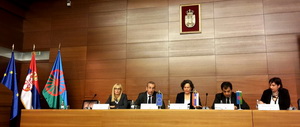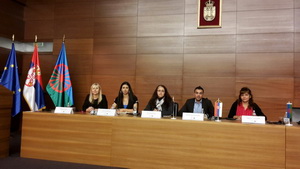 The Social Inclusion and Poverty Reduction Unit of the Government of the Republic of Serbia and the Office for Human and Minority Rights, with support from the Technical Assistance and Information Exchange Instrument (TAIEX) of the European Commission, organised the Workshop on Roma Inclusion Policies at the Deputies Club, Belgrade, on 27 October 2014.
The Social Inclusion and Poverty Reduction Unit of the Government of the Republic of Serbia and the Office for Human and Minority Rights, with support from the Technical Assistance and Information Exchange Instrument (TAIEX) of the European Commission, organised the Workshop on Roma Inclusion Policies at the Deputies Club, Belgrade, on 27 October 2014.
The workshop was focused on the process of development, adoption and implementation of Roma Inclusion Strategies in EU member states, referring to examples of good practice in implementation and existing challenges. Further, examples of Roma inclusion in Serbia from the perspective of civil society organisations were also presented at the meeting, as well as the process of developing the initial foundations for a new strategy for improving the status of the Roma, which is to cover a period from 2015.
The meeting was opened by Kori Udovički, Deputy Prime Minister and Minister of Public Administration and Local Government, H. E. Ambassador Michael Davenport, Head of the Delegation of the European Union to the Republic of Serbia, Suzana Paunović, director of the Office for Human and Minority Rights of the Government of the Republic of Serbia, and Osman Balić, chair of the Standing Conference of Roma Civic Associations. The meeting was chaired by Mirjana Maksimović, deputy manager of the Social Inclusion and Poverty Reduction Unit of the Government of the Republic of Serbia.
Deputy Prime Minister and Minister of Public Administration and Local Government Kori Udovički stated that Roma inclusion was a crucial issue on the path to European integration, in which Serbia had the capacity to excel, as well as possibly the most complex development challenge. She pointed out that Serbia was actively involved in the Decade of Roma Inclusion and was working systematically on implementing the EU framework through the Strategy for Improvement of the Status of the Roma. Further, she stressed that the Government’s task was to make the existing mechanisms and measures sustainable, replicate the successful mechanisms for improving the status of the Roma in as many municipalities and cities as possible, improve coordination of the existing mechanisms and raise their productivity. She highlighted that the issue of improving the status of the Roma requires higher Roma participation in social processes.
 Head of the EU Delegation to Serbia Michael Davenport said that Roma inclusion was a challenge that should be addressed as soon as possible throughout the European Union, and that Serbia was fully involved in this process. He highlighted that Serbia had achieved success in the registration of legally invisible persons, but that some legislation still needed to be adopted in order to remove the obstacles to ascertaining citizenship. In addition, it was necessary to strengthen the health mediator network, as well as the teaching assistant network, and adopt the required legislation on housing. It was also necessary to strengthen the process of Roma women empowerment at both local and national levels. He emphasised that in 2011 the European Commission had adopted the EU Framework for National Roma Integration Strategies, which served as the basis for Member States’ action plans. The European Commission’s role was to monitor the Roma inclusion process in Serbia and to point to the existing challenges, as well as to offer support for preventing social inclusion and promoting inclusion. The role of the EU was also to ensure that the efforts put into the Roma inclusion process were effective in order to achieve the broadest and sustained progress.
Head of the EU Delegation to Serbia Michael Davenport said that Roma inclusion was a challenge that should be addressed as soon as possible throughout the European Union, and that Serbia was fully involved in this process. He highlighted that Serbia had achieved success in the registration of legally invisible persons, but that some legislation still needed to be adopted in order to remove the obstacles to ascertaining citizenship. In addition, it was necessary to strengthen the health mediator network, as well as the teaching assistant network, and adopt the required legislation on housing. It was also necessary to strengthen the process of Roma women empowerment at both local and national levels. He emphasised that in 2011 the European Commission had adopted the EU Framework for National Roma Integration Strategies, which served as the basis for Member States’ action plans. The European Commission’s role was to monitor the Roma inclusion process in Serbia and to point to the existing challenges, as well as to offer support for preventing social inclusion and promoting inclusion. The role of the EU was also to ensure that the efforts put into the Roma inclusion process were effective in order to achieve the broadest and sustained progress.
Director of the Office for Human and Minority Rights Suzana Paunović stated that 20,000 Roma had been registered from 2009, which also enabled their access to other rights. According to Paunović, 369 Roma students had enrolled in secondary schools, and health mediators had made 137,000 visits, thus enabling members of the Roma population to gain access to health care for the first time.
The Office director emphasised that there was political commitment to Roma inclusion in Serbia and that the Office was working on the initial foundations for a new Strategy for Improvement of the Status of the Roma, which should be adopted and take effect in 2015. Non-governmental organisations, local governments, line ministries and the Government worked together on developing the initial foundations in order to provide a sound basis for a good strategy until 2020 and a measurable action plan.
Chair of the Standing Conference of Roma Civic Associations Osman Balić stressed the importance of reaching a social consensus about the issue of Roma inclusion and about the problem of persistent structural discrimination. He noted that violence against the Roma was on the increase, that efforts were required to improve the safety of the Roma, and that the issue of legalisation of Roma settlements needed to be addressed, given that the non-governmental sector had prepared a draft model law to provide a legal framework for this matter.
 In the working part of the workshop, experiences in the development, implementation and monitoring of national Roma integration strategies in the EU were presented, as well as international organisations’ activities relevant to this issue. Examples of good project implementation practices from Spain and Bulgaria and activities of the Council of Europe and Roma Education Fund were presented. The importance of integrated approach to improving the status of the Roma and of investment in education and structural integration of the Roma in the labour market was particularly stressed. Furthermore, activities aimed at the implementation of the Strategy for Improving the Status of the Roma in the RS 2009–2015 were presented, as well as the Initial Foundations for the Development of the Strategy for Improvement of the Status of the Roma in the RS from 2015, prepared by an expert team.
In the working part of the workshop, experiences in the development, implementation and monitoring of national Roma integration strategies in the EU were presented, as well as international organisations’ activities relevant to this issue. Examples of good project implementation practices from Spain and Bulgaria and activities of the Council of Europe and Roma Education Fund were presented. The importance of integrated approach to improving the status of the Roma and of investment in education and structural integration of the Roma in the labour market was particularly stressed. Furthermore, activities aimed at the implementation of the Strategy for Improving the Status of the Roma in the RS 2009–2015 were presented, as well as the Initial Foundations for the Development of the Strategy for Improvement of the Status of the Roma in the RS from 2015, prepared by an expert team.
Conclusions of the Workshop:
- The issue of social inclusion of the Roma is crucial for national development.
- The Republic of Serbia needs a new Strategy for Improving the Status of the Roma, which should also be binding on local governments. A feasible Strategy is needed.
- The Strategy should be developed through an integrated approach, in coordination and cooperation with local governments, with a view to establishing a sustainable system.
- Political will and commitment are vital, along with the establishment of administrative responsibility for its implementation. Precise division of competences is required.
- In Strategy development, special attention should be given to precise budgeting, monitoring and evaluation of the implementation of measures and activities.
- Affirmative actions in education and employment must be clearly foreseen.
- Given that the Strategy should be set up differently as the circumstances have changed considerably compared to the time of drafting the current Strategy, the initial study proposes to reduce the number of policies to four priority areas (education, housing, employment and health care), in line with the EU Framework for National Roma Integration Strategies (compared to 13 in the current Strategy), while horizontal areas would comprise measures targeting youth, women, IDPs, cultural identity etc.
- The focus of the new Strategy should also shift so as to place much more emphasis on local communities.
- According to the Chapter 23 Negotiations Action Plan, the new Strategy should be adopted by the end of the second quarter of 2015, and the next Seminar on Social Inclusion of the Roma in the RS is planned for May/June 2015.
Click here to download the Workshop Agenda.
Download the presentations from the Workshop on Roma Inclusion Policies:
Introductory remarks on development, adoption and implementation of Roma inclusion strategies in EU Member States
Session: Implementation of Roma inclusion Strategies in EU member states: examples of good practice in the implementation and main challenges
- Employment: Teresa Sordé, Universitat Autonoma de Barcelona, Spain
- Healthcare and housing: Rousinova Zornitsa, Bulgarian-Swiss Cooperation Programme – Programme for Promotion of social Inclusion, Bulgaria
Session: Implementation of the Strategy for Improvement of the Status of Roma in the Republic of Serbia 2009-2015 – lessons learned and examples of good practice
 Government of the Republic of Serbia
Government of the Republic of Serbia















 pdf [271 KB]
pdf [271 KB]
Leave a Comment